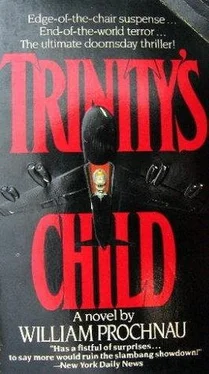“There never was, sir,” Harpoon said quietly.
Harpoon relaxed briefly. Foolishly, he recognized quickly. On the admiral’s flank a clatter interrupted the silence as the colonel rose suddenly, pulling himself up so portentously the eyeglasses slipped on his nose. He cleared his throat in a high wheeze.
Harpoon looked at him with a wan smile. “Looks like the colonel has found the stolen overcoat,” he said.
The colonel glared at him. “Are you, or are you not,” the officer demanded, “going to tell the President about cutting the head off the chicken?”
Harpoon continued staring. “Promised to save that honor for you, colonel. Mister Burr will now yield.” The admiral handed him the light pointer.
Quickly the colonel signaled the projectionist, then turned his full attention to the successor. The map of the Soviet Union fluttered once more, a set of green dots appearing. Many were clustered near Moscow and Leningrad, but others were scattered in more remote regions.
“Unlike the admiral,” the colonel began, “I will keep my words brief, clear, and devoid of defeatist philosophy. Victory is possible, sir, and it is not that complicated.”
Harpoon’s wan smile faded. Little bastard’s got balls, he thought. Too bad somebody planted them between his ears instead of his legs.
“To call back our bombers would not move the Soviets. They would see it as a sign of weakness. They exploit weakness, as they did at Yalta and countless times at Geneva. But what if they did respond and turned their bombers? You observed, quite accurately, that we have lost. The Soviets have reduced us to their level. Their system and their philosophy are still intact. Is that an acceptable outcome for an American President?” He paused, peering in challenge over his glasses.
“Sir, it has been the well-conceived policy of this government to squeeze the Soviets until they collapsed from within. President Reagan predicted that fall. Your predecessor pursued the policy still further. The attack on us is the very proof that the policy has been working. The Premier’s message to your predecessor, intentionally deceptive, acknowledged as much. You, sir, now have the opportunity to put the final nail in the coffin of aggressive Soviet communism.”
Harpoon looked at the colonel in fascinated disbelief, struggling between silence and grim laughter. Nail in the coffin. He’s got his symbols right.
“I predict, sir, as President Reagan did, that the Soviet people will now throw off the yoke of totalitarian dictatorship which has oppressed them so long. They will do it as surely as they overthrew the czars during the First World War.”
Harpoon could not control himself. “In the next half-dozen hours?” he erupted. “For Christ’s sake, colonel, they won’t even be able to find them.”
The colonel turned toward Harpoon with a look of triumph. “No, admiral, they will not. But we will. And you want to withdraw the very weapon with which we can do it.” He abruptly turned away and directed the light pointer at the map.
“Mr. President, the green dots represent Soviet leadership bunkers. Inside those bunkers are the party hierarchy, the Presidium, KGB leaders, the military command, and almost surely the Premier or his successor. They are the head of the Soviet chicken. Cut off that head, and the body dies. The system dies. Forever.”
The colonel paused, gazing expectantly at the successor.
“You telling me that a handful of B-52’s can do that?”
“The perfect instrument, sir.” The colonel smiled. “Those bunkers are hardened much like an ICBM silo. Submarine missiles are not accurate enough to take them out. B-52’s are manned. Most of them are carrying at least four one-megaton bombs plus SRAM or cruise missiles. They can drop those babies right down the smokestack. One aircraft could take out half a dozen bunkers, probably more.”
Harpoon studied the successor’s face carefully. The man seemed deep in perplexing thought. Suddenly he turned toward the admiral. “Harpoon?”
“It’s madness, sir.”
“Well, it seems we just got madness piled on top of madness tonight, admiral.”
“The theory’s been examined thoroughly and discredited thoroughly.”
The colonel blustered in, his voice venomous. “Discredited by men who insist on keeping communications lines open to bandits and murderers and assassins. Men who want to send smoke signals”—the words oozed animosity—“to barbarians who have perpetrated the most despicable, the most heinous act in the history of mankind.”
Harpoon shook his head. “Men who want some remnant of America down there when this plane lands, colonel. We can’t stay up here in our splendid cocoon forever. For Gœ s sake, man, what about the Soviet bombers? What about the thousands of warheads they have in land-based reserves?”
“Victory has its price, admiral,” the colonel replied coldly. “The Soviet forces are a reality. Your smoke signal isn’t going to stop them. And, frankly, I believe you’ve been duplicitous about the Soviet bombers.”
“Duplicitous!” Harpoon started to move on the colonel, then retreated.
“They are not due for five hours. Our communications should be functioning at least minimally by that time. We do have some fighters. We also have thousands of commercial jets available. Use them.”
“You’re joking.”
“Ram the bastards.”
Harpoon slowly seated himself. “Colonel, I cannot believe you are serious. I really cannot. Do you actually believe this country—a country full of panicked Baton Rouges—is in any condition to put together a plan like that?”
The successor suddenly stiffened. “Harpoon, are you im-plyin’ that ramming is a possible defense against bombers? Damn you, are you saying that’s possible?”
Harpoon was beginning to feel woozy. “Sir, for God’s sake—”
“Are you saying that, damn you?”
“In isolated cases, sir,” Harpoon said wearily. “But a hundred and fifty bombers coming in low level from all directions? With our radar out? Even if we got ninety percent of them—which we wouldn’t—do you know what fifteen bombers would do? Fifteen of those blue circles”—Harpoon gestured despondently at me map of the United States—“would instantly turn red.”
“Harpoon,” the successor said, his eyes gleaming angrily, “I don’t think I’ve been getting the whole story. I don’t cotton to that thought. Don’t cotton to it at all.”
Harpoon bristled. “What you’re getting now, sir, is maniacal nonsense. What the devil does the colonel want to do about the ICBM’s? Call the goddamn CIA? Get all our moles to run around Russia putting their fingers in the silos? Good God, man, there is no defense against this stuff.”
The colonel methodically tapped the pointer against the map. “The defense,” he said confidently, “is the Soviet people. Take away those green dots—take away their oppressors—and they will stop the ICBM’s. The defense is to cut the head off the chicken.”
Harpoon took a long, deep breath and then riveted his gaze on the successor. “You’re a westerner, sir. Raised on a farm?”
“You find that a disqualification, Harpoon?”
“Not at all, sir. I’m a farmboy too. Kansas. We raised chickens. Got them ready for my mother’s stewing pot with one stroke of the hatchet.”
“Done it myself. Very effective.”
“Yes, eventually. As a boy, I hated it. The chicken didn’t die right away. It flapped around, headless, splattering blood all over the barnyard.”
The successor smiled thinly at Harpoon’s analogy. “Then it collapsed, Harpoon, and ended up in the pot. This here chicken’s already been spreading a lot of blood around.”
Читать дальше












